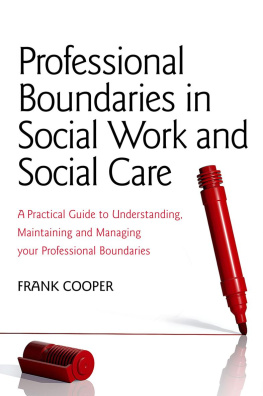Professional
Boundaries in
Social Work and
Social Care
of related interest
500 Tips for Communicating with the Public
Maggie Kindred and Michael Kindred
ISBN 978 1 84905 175 0
A Practical Guide to Working with Reluctant Clients in Health and Social Care
Maggie Kindred
Illustrated by Cath Kindred
ISBN 978 1 84905 102 6
Social Work Under Pressure
How to Overcome Stress, Fatigue and Burnout in the Workplace
Kate van Heugten
ISBN 978 1 84905 116 3
Mastering Social Work Supervision
Jane Wonnacott
ISBN 978 1 84905 177 4
Mastering Social Work Skill series
Relationship-Based Social Work
Getting to the Heart of Practice
Edited by Gillian Ruch, Danielle Turney and Adrian Ward
ISBN 978 1 84905 003 6
The Social Workers Guide to Child and Adolescent Mental Health
Steven Walker
Foreword by Stephen Briggs
ISBN 978 1 84905 122 4
Reflective Practice in Mental Health
Advanced Psychosocial Practice with Children, Adolescents and Adults
Edited by Martin Webber and Jack Nathan
Foreword by Alan Rushton
ISBN 978 1 84905 029 6
Reflective Practice in Social Care series
The Survival Guide for Newly Qualified Child and Family Social Workers
Hitting the Ground Running
Helen Donnellan and Gordon Jack
ISBN 978 1 84310 989 1
Professional
Boundaries in
Social Work and
Social Care
A Practical Guide to Understanding,
Maintaining and Managing Your
Professional Boundaries
FRANK COOPER
Foreword by Jonathan Coe
Jessica Kingsley Publishers
London and Philadelphia
First published in 2012
by Jessica kingsley Publishers
116 Pentonville road
London N1 9JB, UK
and
400 Market Street, Suite 400
Philadelphia, PA 19106, USA
www.jkp.com
Copyright Francis Cooper 2012
Foreword copyright Jonathan Coe 2012
All rights reserved. No part of this publication may be reproduced in any material form (including photocopying or storing it in any medium by electronic means and whether or not transiently or incidentally to some other use of this publication) without the written permission of the copyright owner except in accordance with the provisions of the Copyright, Designs and Patents Act 1988 or under the terms of a licence issued by the Copyright Licensing Agency Ltd, Saffron House, 610 Kirby Street, London EC1N 8TS. Applications for the copyright owners written permission to reproduce any part of this publication should be addressed to the publisher.
Warning: The doing of an unauthorised act in relation to a copyright work may result in both a civil claim for damages and criminal prosecution.
Library of Congress Cataloging in Publication Data
A CIP catalog record for this book is available from the Library of Congress
British Library Cataloguing in Publication Data
A CIP catalogue record for this book is available from the British Library
ISBN 978 1 84905 215 3
eISBN 978 0 85700 446 8
Contents
Foreword
The creation of boundaries is at once a psychic necessity and an illusion. The need to draw lines allows for the existence of categories this is this and not that and, in this way, boundaries make thinking possible. We also establish rules that demarcate psychic space: dont touch me there, dont ask me that. However, there are no real lines, even on a physical level, just horizons where one entity meets another and the outer skin defines the borders between the two. In the psychic world, the lines are more blurry still. Who is to say where ones self ends and the other begins?
Andrea Celenza (2007)
The American psychoanalyst Andrea Celenza captures a central issue in thinking about professional boundaries that they are both real and chimerical. Whilst there must be clear and unequivocal rules which outlaw some forms of behaviour (dont have sex with your clients, dont steal their money, etc.), in day-to-day practice most boundaries require reflection, thought and readjustment where necessary. Of critical importance is the need to be able to articulate any action, with colleagues and with supervisors, and to focus on the clients wellbeing as the trump card in choice-making.
One of my earliest memories is from 1971: my father bringing home a client of his, a young woman who had been prescribed Thalidomide during her pregnancy, and her daughter, whose crude prosthetics fascinated and alarmed us as we rolled around the floor together. Reflecting on this some 40 years later my father, the social worker, did not feel good about his decision to invite her into our home: What must she have thought? he said.
Special treatment, and the urge to provide it, is one of the early warning signs that we teach practitioners to be aware of, part of a potential slippery slope of behaviours which can lead to significant harm for clients, and professional disgrace for the practitioner. Frank Cooper provides helpful checklists and some core questions to assist practitioners in their decision-making.
Awareness of boundaries in professional practice has been around a long time, and they were memorably articulated by Hippocrates, in the Oath written in the fifth century BC . It included mention of staying within what one is trained to do: I will not use the knife [] but will withdraw in favour of such men as are engaged in this work. It was clear on the need for confidentiality: What I may see or hear in the course of treatment or even outside of the treatment in regard to the life of men, which on no account one must spread abroad, I will keep myself holding such things shameful to be spoken about. And it outlawed improper relationships with clients: Whatever houses I may visit, I will come for the benefit of the sick, remaining free of all intentional injustice, of all mischief and in particular of sexual relations with both female and male persons [].
But, as Cooper notes, there has been a dearth of education for social workers and there is no mandatory component on boundaries in formal social work qualifications.
Statutory regulation for qualified social workers has thrown a light on the previously hidden; we now know that significant numbers of cases coming before professional conduct panels have concerned violations of boundaries, in fact they represent one in five of all misconduct findings, a rate far in excess of figures published by, for example, the General Medical Council.
Boundary transgressions occur across all professions and the Clinic for Boundaries Studies is aware of cases involving hospital doctors, surgeons, complementary therapists, priests, psychoanalysts, counsellors and social workers. There appears to be a higher risk in disciplines which involve relationship as a central part of their practice. This may help to explain why there are significant numbers of cases within the talking therapies, why GPs and psychiatrists are reported more often than other doctors to the GMC and, perhaps, why social workers have seen such significant percentages in front of the Social Care Councils.
There are some dangers around the raising of awareness about professional boundaries. One is the overly rigid application of theory, a response which leads to organisational policies which make any self-disclosure by practitioners whatsoever (as one NHS Trust has done) a disciplinary offence. Another is the idea that the boundary breachers are uniquely bad, nothing to do with the rest of the profession, and must be eliminated. In fact, boundary transgressions by intentional predators are much less common than those by ordinary professionals and with this book Frank Cooper does much to improve professional understanding, and to protect the public.










